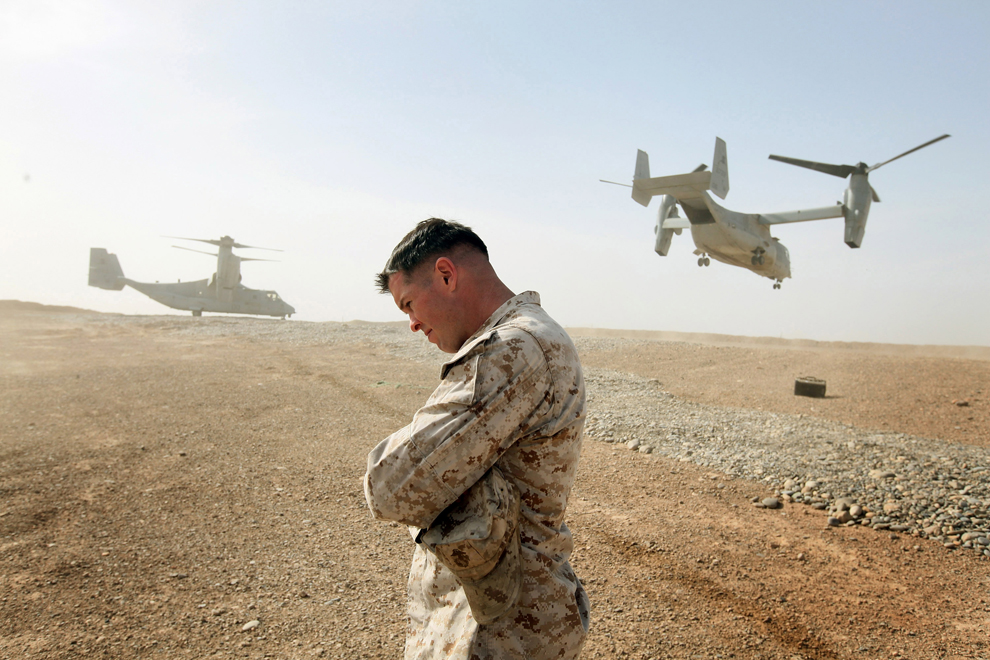Notes
Rotor Wash, In/Visibility of the Afghan War, and My Excellent Weekend at Indiana U.
I wanted to express my appreciation to the Departments of Cultural Studies and Communications at Indiana University for inviting me to participate in the In/Visibility of War conference this weekend.
I did a presentation on the way the coverage of the Iraq and Afghanistan wars have been perpetuating a “narrative of pretend,” the day-by-day imagery creating a mock version of reality showing mock-progress, in mock-relationship with our mock-allies, by way of mock media access depicting mock front lines. My thesis was that no one is going to question these photos, or the often Grand Canyon-sized gap between pictures and reality, however, so long as the images make our cause appear just and our warriors appear heroic.
Scanning the news galleries while flying home, the examples kept coming. Looking at the latest Afghanistan war update from the Boston Globe’s Big Picture, for example, I notice how the introduction to the gallery of 37 photos was primarily focused on the supposedly matter-of-fact process of handing over responsibility for war fighting functions to the Afghanis.
The Boston intro copy reads:
In early April, in an attempt to accelerate the transition of military responsibility to the Afghan government, the US agreed to hand control of special operations missions to Afghan forces, including night raids, relegating American troops to a supporting role. This deal cleared the way for the two countries to move ahead with an agreement that would establish the shape of American support to Afghanistan after the 2014 troop withdrawal deadline. Domestic support for the war (in the US) has dropped sharply. We look back at March in the troubled country. –Paula Nelson
But then, let’s compare that set up to the actual set of photos. Curiously, there isn’t one image that even addresses the transition of military responsibility — the main point of the words above — until you get to photos #35 – 37. Of those, #35 and #36 seem more mundane than convincing, #36 showing Afghan soldiers just killing time. Most strangely, the third and last photo in the set is more pretty than anything else, a night shot of soldiers firing off a mortar. More curious still, however, is that it’s a French unit “holding down the fort.” And why would it be that the collection, the emphasis on the handing over of control, conclude with the responsibility, especially at night (as referenced), continuing to rest in Western hands?
In the example above (#21), the rotor wash — processing the photo through more righteous and heroic notions — more automatically lends itself to impressions of the American soldier’s endurance, singularity and capacity to stand in there when the wind isn’t blowing his way. But then, considering the image with less pretend (in other words, in the midst of a quagmire with no honest exit), rotor wash as a metaphor works as well or better thinking about abandonment and also sand in all of our eyes.
There’s also more war in/visibility this morning from John Lucaites over at No Caption Needed.
And a special IU note: Besides all the talented professors who lent me their wisdom and colleagueship this weekend, especially Lucaites, Jon Simons, Bob Hariman from Northwestern and Purnima Bose, I want to especially thank the grad students. It was really an honor to spend time with you. I learned a fantastic amount from your insights and questions — on blogging, social media and visual critique — and can’t wait for another chance to do it again. Also, a special thanks to Phil Perdue, who I can say I knew “back in the day,” and to IU grad student, Jeremy Gordon, for prompting me think about the war, war images and tragedy in a more mythic sense.
(photo: Scott Olson/Associated Press caption: Maj. Matt O’Donnell of Glenelg, Md. turns away from rotor wash as Osprey aircraft carrying the delegation of U.S. Defense Secretary Leon Panetta leaves from Forward Operating Base Shukvani, Afghanistan.)



Reactions
Comments Powered by Disqus